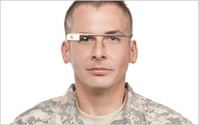 Special operations teams handling tactical maneuvers for U.S. military and law enforcement could become the next viable industries for Google Glass. It could explain some of the
acquisitions the company made late last year.
Special operations teams handling tactical maneuvers for U.S. military and law enforcement could become the next viable industries for Google Glass. It could explain some of the
acquisitions the company made late last year.
Picture a 10-person special weapons and tactics (SWAT) team surrounding a home where an armed gunman barricaded himself. Each SWAT member
wearing Google Glass would snap a photo and share a 360-degree view with other team members to provide a sequence of events. The command center guiding the team also could upload a diagram of the
house or physical structure to provide a floor plan and entrance strategy.
Not only would Google Glass give the SWAT team the ability to share critical information in real time without looking
down at a monitor or in another direction, it would provide an account of events from each team member for future training purposes. The insight into timing that led to either positive or negative
results would become invaluable.
Google Glass could also stream video from a small drone hovering overhead to special ops teams on the ground. When searching backyards, the drone could follow
the suspect. Team members would see the images simultaneously, rather than one person trying to communicate the whereabouts through radio transmissions.
For every positive influence Glass
might create, there's a negative not far behind. In a court of law during a murder case the defense could dissect the 1.8 seconds of video just prior to the suspect's death or surrender.
For military use, think robotics. Google Glass could become the controls for a fully unmanned military special ops team. With Google's recent acquisitions focsued on cameras and robotics, it now
makes sense why late last year the company acquired Schaft, Industrial
Perception, Meka and Redwood Robotics, Bot & Dolly, Autofuss and Holomni. One expert believes Google execs are setting up the company to become a military and government contractor.
Google
isn't the only company building equipment U.S. military and law enforcement could use. U.K.-based Golden-I has created a headset for police officers that
handles facial recognition, scans license plates and monitors vital signs, but the platform can offer so much more.